unit1 How do you study for a test-2018093016001568
重庆市九龙坡区七校联考2018届九年级英语上学期素质测查试题(一)

重庆市九龙坡区七校联考2018届九年级英语上学期素质测查试题(一)第Ⅰ卷(共95分)I. 听力测试。
(共30分)第一节(每小题1.5分,共9分)听一遍。
根据你所听到的句子,从A、B、C三个选项中选出最恰当的答语.。
1. A. It’s great. B. Yes, I have. C. Yes, it is.2. A. Twice a month. B. Three hours. C. Next Monday.3. A. Yes, I am. B. You’re welcome. C. Hold on, please.4. A. All of them. B. English. C. Chinese.5. A. Sure! It’s a piece ofcake.B. No, I couldn’t.C. Yes, I could.6. A. Bad luck. B. Sounds great. C. The more, the better.第二节(每小题1.5分,共9分)听一遍。
根据你所听到的对话和问题,从A、B、C三个选项中选出正确答案。
7. A. Joining an English club. B. Listening to tapes. C. Writing English everyday.8. A. By listening totapes.B. By reviewing the notes.C. By taking notes.9. A. We don’t know. B. No, she doesn’t. C. Yes, she does.10. A. Some chocolate. B. Some flowers. C. A lady.11. A. For two years. B. For two months. C. For two days.12. A. His parents. B. His grandparents. C. His friends.第三节(每小题1.5分,共6分)听两遍。
九级上册单词巧记句型语法剖析(Unit Howdoyoustudyforatest)

九年级上册单词巧记句型语法剖析Unit 1How do you study for a test三点剖析单词·巧记·典句·考点【巧记提示】 a+loud (adj.大声地【经典例句】朗读对每一个英语学习者来说都是必要的。
【考点聚焦】 1)当朗读课文时,一定要用aloud。
如:Reading aloud is different from reading loudly.朗读课文与大声地读课文是有区别的。
2)与aloud 意思相近的词为loudly。
当表示“大声地”时两个词可以相互代替。
如:Who is knocking at the door loudly (aloud)?谁在大声地敲门?【巧记提示】 memor(y)( n.记忆力)+-ize (动词后缀)【经典例句】他就是那个过目不忘的人。
【考点聚焦】掌握它的名词memory 的用法。
1)作“记忆,纪念”讲时,memory 是不可数名词。
如:In memory of Lei Feng,we made a film.为了纪念雷锋,我们拍了一部电影。
2)当memory 指的是“个人的记忆力或记忆的事情”时,是可数的。
如:He has a bad memory for dates.他对日期的记忆力很差。
memories of childhood 童年时的记忆。
【巧记提示】 different(adj.不同)+-ly(副词后缀【经典例句】 Trying to act differently举止与众不同,不会总是对的。
【考点聚焦】注意different adj.,difference n.及differently adv.的词性的不同。
如:Everyone is different from the others.每一个人都与其他的人不同。
I can not tell the differences我说不出这两幅图之间的区别。
Unit 1 How do you study for a test全英分析

Unit 1 How do you study for a testThe Teaching Plan for “Unit 1 How do you study for a test?”I. Analysis of the teaching materialThe content of this lesson is adopted from Go for it Book III Unit1. The topic of this unit is about learning how to study things. By reviewing this unit, students will be able to master the key vocabulary words and sentence patterns of this unit, and they’ll be better to talk about various learning ways, problems in learning, asking for and giving advice, and comments on ways of learning. Obviously, the topic of this unit is related closely to students' actual life, so it will raise students learning interest. They have a great desire to talk about the problems they met in learning English and they wish to solve these problems. So we can provide situations for students to exchange ideas in the process of study and help them find the most suitable ways to improve their English. It will also cultivate students’ ability of using English to solve the practical problems. Besides, students will learn to regard problems as challenges and try their best to find ways to solve them.According to English syllabus, new curriculum standards and the type of the lesson---- revision, I wi ll use “English learning” as a clue to review the key voc abulary and sentence patterns. Wilkings, a great linguist once said, “Without grammar, very little can be conveyed. Without vocabulary, nothing can be conveyed.” So, in this lesson, I lay great emphasis on the review of vocabulary. As words are used in sentences, I will review the key words and phrases in the sentences or contexts. Generally speaking, I’ll review the unit from the following four parts: ways of learning, problems, advice and comments. The four parts connect to each other closely and the topics are from easy to difficult. On the other hand, the four parts involve the main sentence patterns and key vocabulary stu dents must master in this unit. By reviewing the unit like this, at the end of the lesson, students are expected to write a letter about how to learn Chinese well based on what we reviewed.II. Analysis of learning conditionThe students I’m going to teach are from Wencheng Experimental Middle School. Most of them have a strong English background. So in this period, I mainly focus on how to get students to behave actively. And as a famous Italian doctor says, “Tell me and I will forget. Show me and I understand. Involve me and I remember!” In order to help the students maste r the key language points of this unit, I design different tasks for them to do, which will greatly get them involved in the classroom activities. As a result, they will have a better understanding of the language points.III. Teaching Objectives1. Knowledge O bjectives(1) The students will be able to master the key vocabulary words of this unit byreviewing them in different ways: make flashcards, pronunciation, differently, fast, deal with, regard, make mistakes, afraid, too … to …, etc.(2) The students will be able to use the following four sentence patterns in thegiven situations or daily life:①How do you learn English? I learn English by...② Why don’t you / Why not ...?③ Maybe you should …. / You’d better …④ I think studying Engli sh by …is…because…2. Ability Objectives(1)The students will be able to talk about their learning ways, and commenton the ways of learning English as well as the problems they meet in learning English and the solutions to them.(2) The students will be able to get information from reading passage.(3) The students will be able to use the words and sentence patterns reviewedin this period to write a passage about how to learn Chinese well.3. Emotion & attitude Objectives(1) The students will form a correct attitude to study.(2) The students will learn to choose good ways to study.4. Learning Strategies(1) The students will be able to get the information needed from the givenreading material. (Resourceful strategy)(2) The students will be able to make up a dialogue according to the providedsituation. (Communicative strategy)(3) The students will be encouraged to comment on the different ways of learning.(Cognitive strategy)IV. Teaching Focus1.The ways of learning English.2.The comment on the ways of learning English.3.The difficulties in learning English.4.The suitable learning ways for individuals.V. Teaching difficulties1.How to get students to review the key vocabulary and expressions presented inthis unit.Solutions: Review the vocabulary in different ways: brainstorming, practicing, explaining, writing a letter, etc.2.How to enable students to write a passage well enough.Solution: Review the vocabulary and sentence patterns may be used in the passage.3.How to make students master the usage of “verb +by with gerund”.Solution: Design tasks for students to do. By fulfilling the tasks, students are expected to use “verb +by with gerund” and thus know the usages of it well. VI. Teaching Methods1、Communicative approach2、Task-oriented method3、Practicing approach4、Situation-experienced methodVII. Teaching AidsMulti-media equipmentsVIII. Teaching ProceduresStep 1.Leading-in & Brain-stormingT: Class begins! Good morning, everyone!Ss: Good morning, teacher!T: Glad to meet you! Today is the first time we meet each other. Now let me introduce myself to you. I come from No. 2 Experimental Middle School. My name is Hu Haiyan. You can cal l me Miss Hu. I think we’ll have a good time together. Ok, now I’d like to know something about you. What’s your name? What’s your favorite subject? Why?S1: ….T: Do you like English? How do you study English?S2: …T: What about you? What do you think of your way?S3: …T: Hi! Nice to meet you! How long have you been learning English?S4: ….T: Well, most of you have been learning English for many years. And all of you have your own ways to learn English. Now take out the worksheet I gave you just now and fill in the mind map about the ways of English learning. Let’s see who can write t he most ways.(Ss try to write as many ways of English learning as possible.)T: O K. Are you ready? How many ways have you written? Show me your answers please. Who’d like to share your answers?(Ask two or three students to say the ways of English learning.)Design purpose: Talk with students freely can get a general idea about how well students mastered this unit and on the other hand, can help construct a relaxing learning atmosphere. The brainstorming activity can activate students’ knowledge about the ways of learning English. As a result, help them review the phrases of learning ways.Step 2. Survey & ReportT: So there’re many ways of English learnin g. And how do you learn it? What about your friends. What do you think of the ways? Please work in groups of four and make a survey about it. Fill in the chart in your worksheet.(Ss work in groups and try to fill in their charts.)T: Well, have your completed your survey chart?Ss: Yes.T: Good. Let’s make a report. Please pay attention to the sentence patterns you use. For example, when we find one way is not successful, we can say I think it’s not helpful at all. (Write “not …at all” on the blackboard.)Who’d like to give a report about it?(Let 3or 4 students give reports about their survey results.)Design purpose: This activity makes students work cooperatively and use phrases in sentences properly, which will not only review the sentence patterns, but also train students’ communicative ability. As to the students who are good at English,they can further their ability by giving reports about how their friends learn English. And the students will try to express their own attitudes toward various ways of learning in target language.Step 3. InterviewingT: You see, every one has his or her own ways of learning. And some students’ ways are really very successful. Recently there is an English Speech Contest in Wenzhou. Some students really did well in it. And the winders are asked to hold a news conference. Suppose you took part in the contest, too. Now please work in groups of four to role play it. One is the winner; the others are the reporters from different TV stations. Try to ask as many questions as you can.(After students practice for a while, invite one or two students to come to the front as a winner, and let the other students ask them questions about English learning.)Design purpose: There are two purposes for the design of the News Conference: One is to review the two sentence patterns “Do you …” and “Have you ever …” And the other is to train students’ speaking ability and activate the classroom atmosphere ---- Get every student involved in the activity.Step 4. PracticingT: Congratulations! Your spoken English is really wonderful. What about other students? It seems you’re not confident enough to come to the front. Are you good at English? Do you have any difficulties in learning English? If so, what are they?(Let some students talk about the problems they face.)T: Well, don’t worry. It’s quite common to meet problems while learning something. My students have trouble learning English, too. Here’re their problems. But some of the words are missing. Can you help me to complete the sentences? Please take out the worksheet again. And try to complete the sentences in it.(Check the answers after students finish the task and help the students to review the key words and phrases presented in the ten sentences.)Design purpose: By doing exercise, students will review the main sentence patterns about the problems students meet in learning English and the words related to this topic. And in the process of checking the answers, the teacher can remind the students of the usages of some important words and phrases.Step 5. PairworkT: Well done. You’ve got all the answers right. But here comes another problem. There are so many problems we may meet in learning English, but we still need to learn English well. How can we deal with them? How do you deal with the problems you meet in learning English? Show me your ideas.(Let different students talk about how they solve problems.)T: Good idea. I’ll tell these solutions to my students. Do you know how I usually solve my problems?Ss: No.T: Well, generally speaking, I have two ways to solve problems. First of all, I’ll deal with my problems by regarding them as challenges. And I’ll try my best to overcome the difficulties. And if I can’t solve them by myself, I’ll ask someoneelse for advice. Do you like to ask others for advice?Ss: Yes.T: Then let’s work in pairs and tell your partner your problems. I think we can solve the problems together. Do you think so?(Ss work in p airs and make conversations. After they practice for a while, invite some pairs of them to present their conversations.)Design purpose: In this activity, students are asked to ask for and give advice to each other. By doing this, students will review the sentence patterns about how to make suggestions.Step 6. ReadingT: Good job. I wish all of you will try to regard all your problems as challenges and try your best to overcome them. I really appreciate these kinds of people. My friend Tom is such a person. Let’s see what problems he met and how he solved them. Please read the passage about him in your worksheet and try to complete the chart below it.(Students read the passage individually and try to get information to fill in the chart.)T: Are you ready?Ss: Yes.(Check the answers.)T: Excellent! Your reading ability is pretty good. Now we’ve known how Tom studied English. What do you think his solutions? I think studying English by joining an English club is a good way because you can ask others when you have questions. What’s your opinion?(Let different students comment on the ways of learning English, using the sentence pattern “I think studying English by… is … because…”) Design purpose: In this part, students are supposed to get information from the reading passage quickly and to give comments on ways of learning by using the sentenc e pattern “I think studying English by … is … because ….” As to this step, students should learn to combine simple sentences to make a complex one. This will help them improve their writing ability.Step 7 WritingT: Ok. Today we talked much about English learning. Suppose you have a pen pal named Bob is coming to Wencheng soon. And he’d like to learn Chinese. As a Chinese, I believe you can give him much advice. Please write a letter to him and tell him how to learn Chinese well. You can use the key words provided in your worksheet. And here are some tips for you. Try to answer the following questions in your mind, and you’ll know what should be included in your writing.1.How long have you been learning Chinese?2.How did you learn Chinese?3.What challenges did you meet in learning Chinese?4.What’s your attitude toward the problems you met?5.How did you deal with the problems of Chinese learning6.What do you think your ways of learning Chinese?(Ss work individually to write the letter. If time is enough, I’d as k some of the students to read their letters and give comments on them.)Design purpose: The writing task is designed to see if students have already mastered all the points reviewed in this period. And it provides students a chance to output the language they learned. On the other hand, this activity helps students have a summary of what they have reviewed in this unit by answering the questions the teacher provided in sweet tips. Step 8. Emotional Education T: How t ime flies. There is not enough time for us to present your writing now. Before we end the lesson, I’d like to have a word with you. Where there is a will, there is a way. Believe yourself and work persistently, you’ll get good grades in the Entrance Examination to Senior Middle School.Design purpose: This step is to guide students to form a good attitude toward the difficulties they meet in learning procedures or daily life.Step 9. HomeworkT: Ok. Today’s homework:1. Make a vocabulary list of the key words and expressions learned in this unit.2. Finish your writing and try to improve it.3. Complete the two exercises in your Homework sheet.So much for today’s lesson. Wish you succeed every day. Goodbye, class. Ss: Goodbye, Miss Hu.IX. The blackboard designReview of Unit 1 How do you study for a test? I learn English by …. (Verb + by gerund)Do you …?Have you ever …?What / How about doing sth?Maybe you should You ’d better do sth. Why not / Why don ’t you do sth?I think studying English by … is … because …not …at all pronunciation(n.) pronounce(v.) be afraid to do.=be afraid of doingfrustrating frustrated make mistakes spoken / written Englishtoo … to …deal with。
2018年秋人教版九年级英语(广东)作业:Unit1 Section A 闯关训练
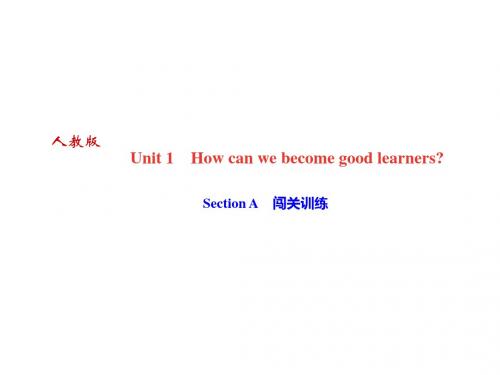
This is a difficult task.However,if you try to learn by heart only part of each lesson,you'll find it not half so hard as you might have thought.Learning in this way,you will __5__ rapid progress.Of course,writing is also necessary.It helps you __6__ on your way to success in English.
A
( )4.—Excuse me.Do you know Mrs.Wang's telephone number? —Sorry,I don't know.But you can ________ in this telephone book. A.look it up B.look over it C.look it over D.look up it
4.我第一次看《舌尖上的中国》就喜欢上了它。
I _f_e_ll_i_n_l_o_v_e__w_i_th_A Bite of China when I watched it for the first time.
5.因为想弄明白这个故事,我在网上查阅了它们。
Because I wanted to understand the story,I __lo_o__k_e_d_t_h_e_m__u_p___on the
—________. A.For listening to tapes B.At school C.By reading the textbook D.To make word cards
Unit1 How do you study for a test
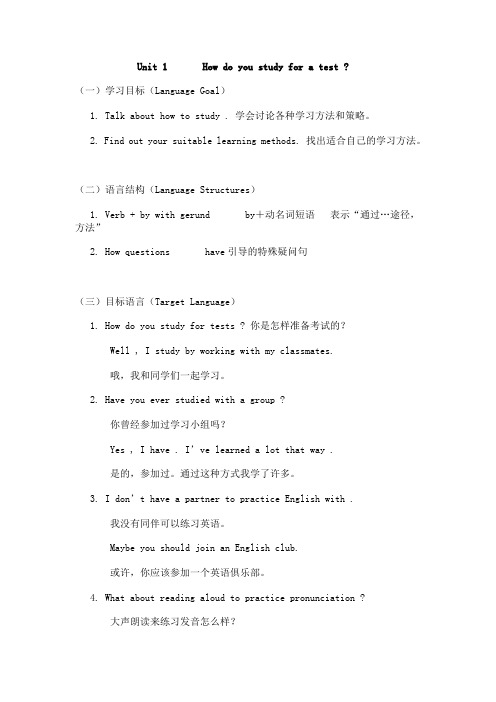
Unit 1 How do you study for a test ?(一)学习目标(Language Goal)1. Talk about how to study . 学会讨论各种学习方法和策略。
2. Find out your suitable learning methods. 找出适合自己的学习方法。
(二)语言结构(Language Structures)1. Verb + by with gerund by+动名词短语表示“通过…途径,方法”2. How questions have引导的特殊疑问句(三)目标语言(Target Language)1. How do you study for tests ? 你是怎样准备考试的?Well , I study by working with my classmates.哦,我和同学们一起学习。
2. Have you ever studied with a group ?你曾经参加过学习小组吗?Yes , I have . I’ve learned a lot that way .是的,参加过。
通过这种方式我学了许多。
3. I don’t have a partner to practice English with .我没有同伴可以练习英语。
Maybe you should join an English club.或许,你应该参加一个英语俱乐部。
4. What about reading aloud to practice pronunciation ?大声朗读来练习发音怎么样?Why don’t you join an English language club ?你为什么不参加一个英语俱乐部呢?(四)Key words and phrases (重点词汇)1. flashcard n. 抽认卡2. frustrating a. 令人沮丧的3. memorize v. 记忆,背诵4. aloud adv. 出声地、高声地5. comma n. 逗号6. pronunciation n. 发音7. solution n. 解决办法8. not at all 根本(不)全然(不)9. end up 结束,告…终10. make mistakes 犯错11. later on 以后;随后12. be afraid to 害怕去做13. laugh at sb. 笑话;取笑(某人)14. take notes 做笔记,做记录15. enjoy doing sth . 喜欢做…乐意做…16. native speaker 说本族语的人17. make up 组成、构成(四)重点、难点:(Key points and difficulties)1. by 介词,表示“通过…方法或途径”的意思,译成“靠、通过”by后面可以加名词或动名词短语eg.(1)The house was destroyed by fire. 房屋被火烧毁了。
Unit 1 How do you study for a test (全单元课件)

需要更完整的资源请到 新世纪 教育网 -
Frozen man-Chen Lei’s web life
坚强的意志
He is Chen Lei, a young man with a strong will. he can’t walk and even can’t move, so he is called a frozen man, but he decides not to give up his dream Of learning. Because of the illness, he has no chance to go to school, so he learns by himself. 需要更完整的资源请到 新世纪
by not doing…
noise pollution
How should we deal with the noise pollution?
We can solve the problem by doing…
需要更完整的资源请到 新世纪 教育网 -
by not doing…
需要更完整的资源请到 新世纪 教育网 -
Solutions
By studying hard By talking to people about them By thinking your problem is not big By seeing a psychologist By thinking of a problem in a positive way …… (积极的,正面的)
教育网 -
China is a developing country.
adj. 发展中的 But America is a developed country. adj. 发达的 What are your plans for the development of your country? n. 发展
2018-2019-九年级英语练习册答案-推荐word版 (14页)
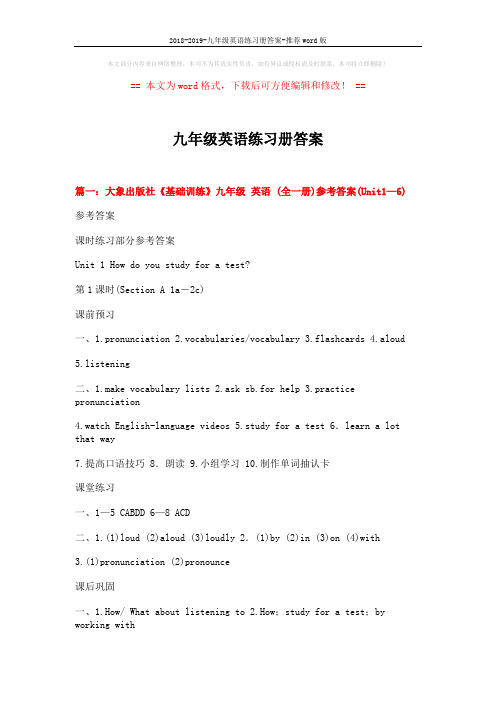
本文部分内容来自网络整理,本司不为其真实性负责,如有异议或侵权请及时联系,本司将立即删除!== 本文为word格式,下载后可方便编辑和修改! ==九年级英语练习册答案篇一:大象出版社《基础训练》九年级英语 (全一册)参考答案(Unit1—6)参考答案课时练习部分参考答案Unit 1 How do you study for a test?第1课时(Section A 1a-2c)课前预习一、1.pronunciation 2.vocabularies/vocabulary 3.flashcards 4.aloud5.listening二、1.make vocabulary lists 2.ask sb.for help 3.practice pronunciation4.watch English-language videos5.study for a test 6.learn a lot that way7.提高口语技巧 8.朗读 9.小组学习 10.制作单词抽认卡课堂练习一、1—5 CABDD 6—8 ACD二、1.(1)loud (2)aloud (3)loudly 2.(1)by (2)in (3)on (4)with3.(1)pronunciation (2)pronounce课后巩固一、1.How/ What about listening to 2.How;study for a test;by working with3.too;to say4.a lot that way5.Watching English-language;improved二、1.How do you learn English 2.Have you ever studied with a group3.It’s too hard to understand the voices4.How about singing English songs5.That’s a good idea三、1—5 CBDCB 6—10 AADCB第2课时(Section A 3a-4)课前预习一、1.specific suggestions 2.memorize the words of pop songs 3.study grammar 4.feel differently 5.speak too quickly/fast 6.end up doing sth.7.the best way to do sth. 8.be excited about sth.二、1.specific suggestions 2.studying grammar 3.feel differently4.ended up 5.speak too quickly 6.Memorizing the words of pop songs 课堂练习一、1—5 CAACB 6—10 BCBDA二、1.excited;exciting 2.frustrating;frustrated 3.different;differently4.quick;quickly5.about;for三、1.to memorize2.differently 3.studying 4.living 5.getting 课后巩固一、1.I have a problem with my English/I’m having trouble in learning English2.Well,listening can help3.I always forget a lot of new words/I can’t memorize new words4.Can you understand when people talk to you/Do you understand other people when they are talking5.Goodidea/Sounds good/I’ll do that way二、1—5 DDCBD三、1.about 2.Many ing 4.suggestions 5.for 6.was7.memorizing 8.also 9.When 10.never第3课时(Section B 1a-2c)课前预习一、1.make mistakes in sth. 2.spoken English 3.join an English (language) club 4.practice speaking English 5.how to use commas6.write in the notebook二、1—5 BDCAE课堂练习一、1—5 BCBCD 6—8 BCB二、1.spoken 2.slowly 3.pronounces 4.stay;have 5.to spend6.playing 7.solutions三、1.in 2.in 3.with/about/to 4.in 5.for 6.about 7.about 课后巩固一、1—5 BCABB 6—10 ADCAD二、1—5 DCBAC第4课时(Section B 3a-4)课前预习1.learn to do sth. 2.first of all 3.It doesn’t matter. 4.be afraid to do sth. 5.laugh at sb. 6.take notes 7.make complete sentences 8.have trouble doing sth. 9.decide to do sth. 10. enjoy like doing sth.课堂练习一、1—5 BDBCD二、1.finding 2.walk 3.talking 4.quickly ing三、1.(1)say (2)tells (3)say (4)talking (5)say (6)talk (7)speaking(8)speak 2.(1)another (2)the other (3)other (4)others四、1.of facing ter on 3.no;finding 4.decided to课后巩固一、1.to take lots of grammar notes ter on;realized 3.one of the secrets 4.am impressed/moved 5.is afraid to;laugh at 6.First of all;learn to二、1.C 2.②B ③A 3.对于某些阅读材料,你必须随时变换阅读速度,从快到慢,从慢到快。
2018人教版九年级英语全册教案(2)(K12教育文档)

2018人教版九年级英语全册教案(2)(word版可编辑修改)编辑整理:尊敬的读者朋友们:这里是精品文档编辑中心,本文档内容是由我和我的同事精心编辑整理后发布的,发布之前我们对文中内容进行仔细校对,但是难免会有疏漏的地方,但是任然希望(2018人教版九年级英语全册教案(2)(word版可编辑修改))的内容能够给您的工作和学习带来便利。
同时也真诚的希望收到您的建议和反馈,这将是我们进步的源泉,前进的动力。
本文可编辑可修改,如果觉得对您有帮助请收藏以便随时查阅,最后祝您生活愉快业绩进步,以下为2018人教版九年级英语全册教案(2)(word版可编辑修改)的全部内容。
Unit 1 How can we become good learners?学习目标认知目标:1。
Talk about how to study。
学会讨论各种学习方法和策略。
2。
Find out your suitable learning methods. 找出适合自己的学习方法。
情感目标:通过对学习方法的学习,培养学生用正确而科学的方法做事的能力,明白“一份耕耘,一份收获”。
技能目标:(1)熟练掌握下列词汇: aloud pronunciation discover repeat notepronounce increase speed partnercreate active connect review knowledgewisely born attention(2)熟练掌握下列短语: work with friends ask the teacher for helpread aloud look up practice pronunciationconnect…with… pay attention to (3)掌握下列句型:How do you study English?I learn by working with a group.Do you learn English by reading aloud?Yes, I do. It helps my pronunciation。
九年级英语教案
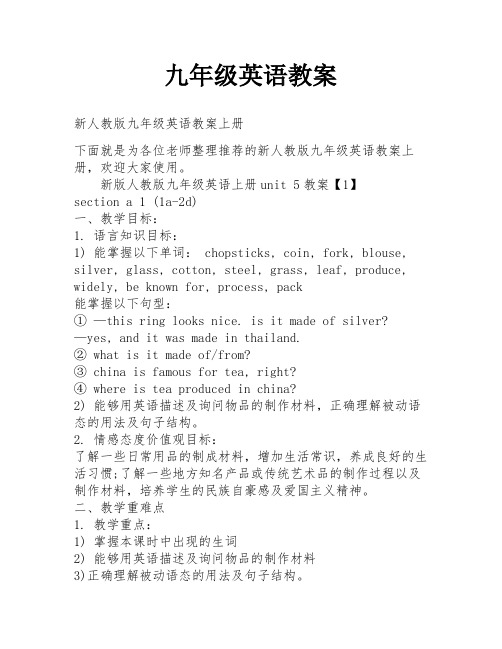
九年级英语教案新人教版九年级英语教案上册下面就是为各位老师整理推荐的新人教版九年级英语教案上册,欢迎大家使用。
新版人教版九年级英语上册unit 5教案【1】section a 1 (1a-2d)一、教学目标:1. 语言知识目标:1) 能掌握以下单词: chopsticks, coin, fork, blouse, silver, glass, cotton, steel, grass, leaf, produce, widely, be known for, process, pack能掌握以下句型:① —this ring looks nice. is it made of silver? —yes, and it was made in thailand.② what is it made of/from?③ china is famous for tea, right?④ where is tea produced in china?2) 能够用英语描述及询问物品的制作材料,正确理解被动语态的用法及句子结构。
2. 情感态度价值观目标:了解一些日常用品的制成材料,增加生活常识,养成良好的生活习惯;了解一些地方知名产品或传统艺术品的制作过程以及制作材料,培养学生的民族自豪感及爱国主义精神。
二、教学重难点1. 教学重点:1) 掌握本课时中出现的生词2) 能够用英语描述及询问物品的制作材料3)正确理解被动语态的用法及句子结构。
2. 教学难点:理解被动语态的用法及句子结构。
三、教学过程ⅰ. lead in1. 播放动画片《造纸过程》的视频,让学生们了解这个中国传统发明的情况。
t: who invented paper first?s1: can lun invented it in han dynasty.t: what was paper made of then?s2: it was mainly made of bamboo.t: was it easy for people to make paper then?s1: no, it was very difficult then.t: what is paper made of now?s3: it’s mainly made of wood, bamboo, and cotton.…ⅱ. presentation1. present the sentence structure, using the pictures on the big screen:—what’s the golden medal made of?—it’s made of gold.—is this table made of wood?—no, it isn’t. it’s made of glass.—is butter made from meat?—no. it’s made from cream?让学生们学习掌握be made of/from句型的用法,及be made of与be made from的区别。
Unit 1 How do you study for a test
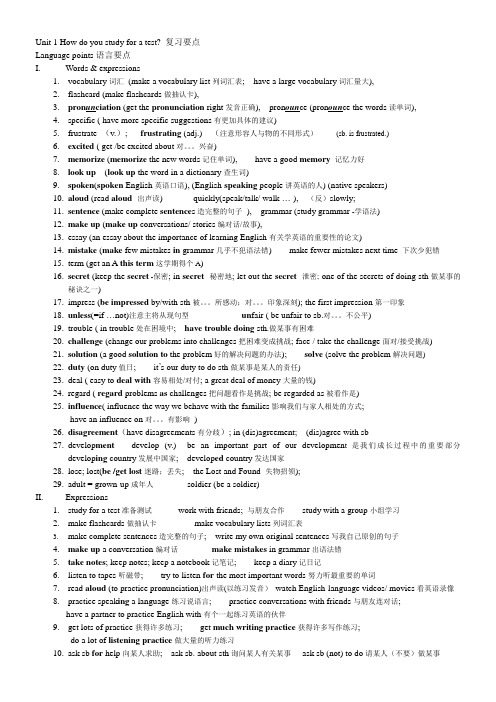
Unit 1 How do you study for a test? 复习要点Language points语言要点I.Words & expressions1.vocabulary词汇(make a vocabulary list列词汇表; have a large vocabulary词汇量大),2.flashcard (make flashcards做抽认卡),3.pron un ciation (get the pronunciation right发音正确), pron oun ce (pron oun ce the words读单词),4.specific ( have more specific suggestions有更加具体的建议)5.frustrate (v.); frustrating (adj.) (注意形容人与物的不同形式)(sb. is frustrated.)6.excited ( get /be excited about对。
兴奋)7.memorize (memorize the new words记住单词), have a good memory记忆力好8.look up(look up the word in a dictionary查生词)9.spoken(spoken English英语口语), (English-speaking people讲英语的人) (native speakers)10.aloud (read aloud -出声读) quickly(speak/talk/ walk …-), (反)slowly;11.sentence (make complete sentence s造完整的句子), grammar (study grammar -学语法)12.make up (make up conversations/ stories编对话/故事),13.essay (an essay about the importance of learning English有关学英语的重要性的论文)14.mistake (make few mistakes in grammar几乎不犯语法错) make fewer mistakes next time 下次少犯错15.term (get an A this term这学期得个A)16.secret (keep the secret -保密; in secret -秘密地; let out the secret -泄密; one of the secrets of doing sth做某事的秘诀之一)17.impress (be impressed by/with sth被。
Unit 1 How do you study for a test
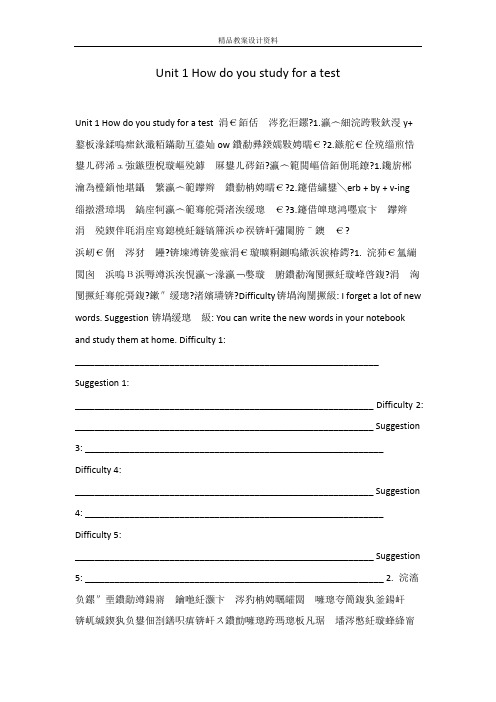
Unit 1 How do you study for a testUnit 1 How do you study for a test ?1.瀛︿細浣跨敤鈥渂y+鐜板湪鍒嗚瘝鈥濈粨鏋勪互鍙奾ow鐨勫彞鍨嬬敤娉曘€?2.鏃舵€佺殑缁煎悎?瀛︿範閲嶇偣銆侀毦鐐?1.鑱旂郴?2.鑳借繍鐢╲erb + by + v-ing?3.??锛堜竴锛夎瘯涓€璇曠粡鍘嗚繖浜涙椿鍔?1. 浣犻€氳繃В?闅撅紝骞舵彁鍑?鏉″缓璁?渚嬪瓙锛?Difficulty锛堝洶闅撅級: I forget a lot of new words. Suggestion: You can write the new words in your notebook and study them at home. Difficulty 1:_____________________________________________________________ Suggestion 1:____________________________________________________________ Difficulty 2: ____________________________________________________________ Suggestion 3: ____________________________________________________________ Difficulty 4:____________________________________________________________ Suggestion 4: ____________________________________________________________ Difficulty 5:____________________________________________________________ Suggestion 5: ____________________________________________________________ 2. 浣滀?(1). Listening skill: (2). Speaking skill: (3). skill: (4). skill: 锛堜簩锛夎繛璇嶆垚鍙?1. study, How , you , do , for , test a __________________________ ? 2. by, study, listening, I, tapes, to ,__________________________. 3. you, do , by , learn , reading , English , aloud__________________________? 4. should, find , you , pen pal a__________________________. 5. can鈥檛, a lot of , I , new , words , memorize__________________________?锛堜竴锛?a -1b Reading and checking 1. Learning English can be both easy and difficult. What things are easy for you? And what things are difficult for you? Easythings:_______________________________________________________________ _ Difficultthings:_____________________________________________________________ 2. 1b making a list. Now turn to page 5, read the list on the top and check 鈭歵he statements that are true for you. You have read and checked the statements true for you. Now think and make a list of other things difficult for you, too. 锛?锛塈don鈥檛know how to鈥? 锛?锛塤____________________________________ 锛?锛塤____________________________________ 锛堜簩锛塋istening 2a-2b 1. Paul is a nice boy. He works hard at his English, but still has many learning challenges. Now listen to find out what challenges he has and check them in the box on page 5. Challenges to Paul at learning English (1)._____ can鈥檛get the pronunciation right.(2)._____ forget a lot of new words. (3)._____ can鈥檛understand when people talk to me. (4)._____ can鈥檛understand the words in magazines. 2. 2b Listening and matching Now listen again to Paul talking about his challenges at learning English and match them with the solutions listed in the box on page 5. While listening, pay attention to the structures of the sentences. 锛堜笁锛?c Doing pair work 鏍规嵁涓?A: I don鈥檛have a partner to practice English with. B: Maybe you should join an English language club. A: I gorget a lot of new words. B: Why don鈥檛you write them in your notebook and study them at home? I don鈥檛have a partner to practice English with. Maybe you should join an English language club. I can鈥檛get the pronunciation right. Listening can help. I forget a lot of new words. Write the new words on cards and study them daily. I can鈥檛understand when people talk to me. You can join an English club to talk to people more in English. I can鈥檛understand the words in magazines. You can look them up in a dictionary. I don鈥檛get much writing practices. Start writing an English diary every day. I read very slowly. You should read to the recording of the text. I make mistakes in grammar. Why don鈥檛study the basic sentence patterns?锛堜竴锛夎瘝姹?1. 鏍规嵁鍙ユ剰锛岀敤鎵€缁欏崟璇嶆?(1). He studies English by (make) vocabulary lists. (2). You should pay more attention to your (pronounce). (3). I鈥檓too (excite) to say anything. (4). Can you always understand (speak) English? (5). I want some (suggest) about learning English. (6). Reading more books is (help) what to do today. (7). I can understand what they said (complete). (8). Everyone wants to become a good language (learn). (9). My grandfather enjoys (watch) Beijing Opera. (10). He has a good (memorize) for numbers. 锛堜簩锛夊崟椤归€夋嫨1. Have you studied working a group? A. by, to B. by, with C. in, to D. in, with 2. He is good at English, so it's for him to understand the English books. A. hard B. boring C. quick D. easy 3. Chinese English learners often talk about topics in English at first but up in Chinese at last. A. end B. start C. stop D. go 4. Although he practiced reading those English words a lot he the pronunciation. A. finished B. remembered C. forgot D. improved 5. Bob is a football fan and he almost every football game. A. watches B. sees C. finds D. looks at 6. I know you don't like spending time with strangers, . A. too B. either C.neither D. also 7. new English words in a vocabulary list is a good way to improve English. A. Getting down B. Looking down C. Turning down D. Writing down 8. Students often conversations in class to learn English. A. make up B. spell C. find out D. laugh at 9. English is in science. A. helpful B. specific C. popular D. original 10. Surfing is the most exciting sport that I have done. A. just B. yet C. never D. ever 11. He asked me 锛?A. whose dictionary it was B. whose dictionary was it C. whose dictionary is it D. whose dictionary it is 12. On my way home, I met an old friend of We hadn't seen each other for a long time. A. myself B. me C. my D. mine 13. Look at that book on the desk. It yours. A. maybe B. can C. may be D. must 14. The now is that we have lots of to ask. A. problem, questions B. question, problems C. question, problem D. problem, question 15. I have to go now. Please remember to the lights when you leave. A. turn off B. turn down C. turn up D. turn on涔燩3 浜斻€佹暀瀛﹀弽鎬濃€曗€曞惈鏁欏笀鐨勬暀鍚庡弽鎬濆拰瀛︾敓鐨?1.鎴戠殑鏀惰幏____________________________________________________________ 2.鎴戠殑鐤戞儜____________________________________________________________。
Unit 1 How do you study for a test-201809301531018

Dongqian Lake is really an old lake with an area of 22 square kilometers, which is 5 times as large as that of the West Lake.
time: A. something that is measured in
water pollution
How should we deal with the water pollution? We can solve the problem by doing… by not doing…
noise pollution
How should we deal with the noise pollution?
minutes, hours, years
B. used to say how often something
happens
C. used to say how much bigger,
better etc one thing is than another
And it’s the base of chemical industry in East China.
We can solve the problem by doing…
base: A. the main place for your
business
B. to use someplace to be the
main place for your business C. to be completely wrong
And Ningbo Grand Theatre is also a good choice to enjoy yourself.
Unit 1 How do you study for a test

学校:年级:九年级2013年9月3日第一周星期一第一节课主讲人:个人手机:邮箱:Unit1 How do you study for a test ?一).明确目标,感知新词Learning Goals:Students can learn how to read the new words in the unit and try to remember most of the words, for example different /differently, easy/easily(adj. and adv.). They can listen, read and use these new words. Then they can make a story with the new words and try to memorize this story. In this class, they can also try to learn and practice the ways of learning English and make a list of problems and solutions they often meet in learning English. Teaching and learning steps二).交流巩固,明确读音Step 1Learn to read the words1. First get the students to try their best to read the new words in this unit according to the phonetics given by themselves and underline the difficulties they meet.2. Then give them a few minutes to deal with the problems they have in their pronunciation in pairs or groups. The teacher can walk around to help them if necessary .3.Next, get individual students to read the new words to the class, the others listen. If possible , the teacher gets the student to correct some pronunciations .When necessary, the teacher should correct the mistakes himself or herself.4. Last, get the students to read the words twice after the tape . Then give them a few more minutes to read all the words quickly to consolidate the pronunciation.三).探究归类,巧计单词Step 2 : Learn to remember words一.Remember the words or phrases by looking at pictures (Make a competition in groups!Divide the new words into three parts. (P 146). Ask students to try their best toremember new words or phrases ) (给学生一些时间尽可能快速记忆单词或词组,展示图片让学生站起来抢答单词并拼写,看哪一组记得效果更好)memorize the words reading the textbook vocabularymake up conversations, take notes learnerflashcard comma afraidfrustrated aloud soldiermake mistakes essay look up 二. Remember the phrases by matching itself with its meaning.It doesn’t matter. 尽力做某事deal with 突然中止友谊be angry with sb. 没关系go by 把------当作try one’s best to do sth. 生某人的气break off friendship 记语法笔记make mistakes 害怕做某事make up conversations 以后,随后later on 处理,应付be afraid to do sth./of doing sth. 编造对话take grammar notes 犯错误regard --- as 过去;消逝三.Remember the words by conversion(转换) 、complex words (合成)and derivative (派生),1.动词-----形容词frustrate(v..使失望)-frustrating (adj.令人失望的)-frustrated(adj.失望的)impress(v.使感动)----impressed(adj.印象深刻的)2.动词---名词pronounce(v.发------音)---- pronunciation(n.发音),solve(v.解决,解答)---solution(n.问题疑难的解决办法)influence(v.影响,对------起作用)----influence(n. 影响),disagree(v.不同意)----disagreement(n.分歧,意见不合),develop(v.发展)----development(v.发展、发育,成长),face(v.面临、面对)---face(n.脸)learn(v.学习)----learner(n.学习者)3.反义词或近义词slowly(adv.慢地、缓慢地)----quickly(adv.快地、迅速地),word(n.单词)---vocabulary(n.词汇),quickly(adv.快地、迅速地)---fast(adv.快地、迅速地)4.形容词---副词different(adj.不同的)--- differently(adv.不同地),easy(adj.容易的)----easily(adv.容易地),5.否定前缀fair(adj.公平的)---- unfair(adj.不公平的),important(adj.重要的)---- unimportant(adj.不重要的),agreement(n. 意见一致)---- disagreement(n. 分歧、意见不同)6. 合成词flash(n. 闪光;闪光灯下摄成的照片)+ card(n. 卡片)--- flashcard ( n. 抽认卡) 四、Remember the words by comparing to its similar words and their similar pronunciations and forms.1. al ou d [au](adv.大声地)-----pron ou nce(v.发------音)-----ou r----m ou se------cl ou d------m ou th------pr ou d------l ou d----- m ou ntain2. solu tion [-∫n](n.问题疑难的解决办法)----dic tion ary------vaca tion------atten tion3.sl ow ly [əu](adv.慢地、缓慢地)-----kn ow ------wind ow------r ow------sh ow------yell ow4. t er m [ə:] (n.学期)------G er man ------- s er ve ------h er5.s o ft [כ] (adj.柔软的)-------b o x-------d o g-------s o ck------- f o x-------f o ggy------- n o t6.d ea l [i:] (v.处理)-----p ea----s ea-----t ea---b ea ch----r ea d-----l ea d -----b ea t---m ea t7.ad u lt [∧](n.成年人)-------b u t-------l u ck. -------s u n----l u nch---m u chStep 3 Consolidation of words1.Give the students a few minutes to try to memorize the words first . Then get them to work in pairs to spell the words or write down the words with the Chinese given in Zhuxue. Underline the words they haven’t grasped.(小组合作快速记忆,并相互提问检查,同时,利用助学查缺补漏。
Howdoyoustudyforatest
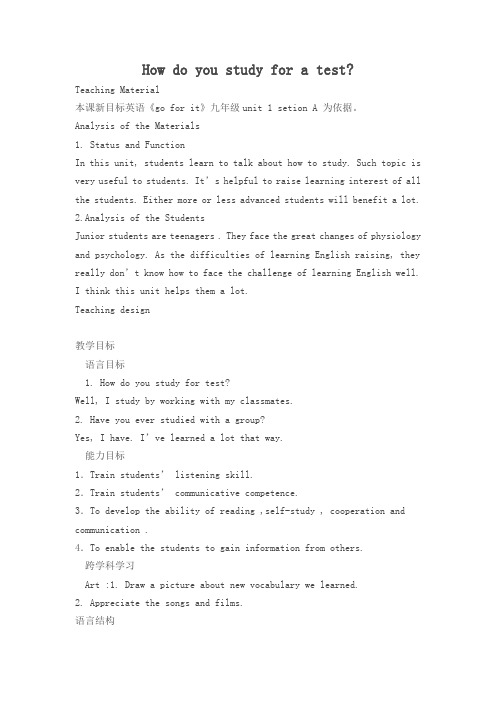
How do you study for a test?Teaching Material本课新目标英语《go for it》九年级unit 1 setion A 为依据。
Analysis of the Materials1. Status and FunctionIn this unit, students learn to talk about how to study. Such topic is very useful to students. It’s helpful to raise learning interest of all the students. Either more or less advanced students will benefit a lot.2.Analysis of the StudentsJunior students are teenagers . They face the great changes of physiology and psychology. As the difficulties of learning English raising, they really don’t know how to face the challenge of learning English well.I think this unit helps them a lot.Teaching design教学目标语言目标1. How do you study for test?Well, I study by working with my classmates.2. Have you ever studied with a group?Yes, I have. I’ve learned a lot that way.能力目标1.Train students’ listening skill.2.Train students’ communicative competence.3.To develop the ability of reading ,self-study , cooperation and communication .4.To enable the students to gain information from others.跨学科学习Art :1. Draw a picture about new vocabulary we learned.2. Appreciate the songs and films.语言结构Verb + by with gerund语言功能认识学习方法,克服学习困难。
- 1、下载文档前请自行甄别文档内容的完整性,平台不提供额外的编辑、内容补充、找答案等附加服务。
- 2、"仅部分预览"的文档,不可在线预览部分如存在完整性等问题,可反馈申请退款(可完整预览的文档不适用该条件!)。
- 3、如文档侵犯您的权益,请联系客服反馈,我们会尽快为您处理(人工客服工作时间:9:00-18:30)。
I study by listening to cassettes.
How do you learn English?
I learn by studying with a group.
Do you learn English by reading aloud?
教育网 -
I learn English
by
Specific
suggestions
How do they learn English ? Listen to the tape and check the question you hear .
aloud adj.出声的;高声的
需要更完整的资源请到 新世纪 教育网 -
用already, yet, ever或still填空 ever seen a bear? 1. Have you _____ yet 2. I haven’t finished my homework _______. already 3. I have _______ left home at seven o’clock. still 4. He is _______ here. yet 5. My friends have not arrived _____. already still hot. The soup has ________ 6. The soup is _____ cold.
本题的关键是首先判断句子的类型,如肯定句排除yet,否定和疑问句一般不 用already’其次注意副词在句中的位置,如already和ever一般不用于句尾, 而yet则常用于句尾;最后根据具体的句意及语气选用适当的词。
需要更完整的资源请到 新世纪 教育网 -
Unit 1 How do you study for a test?
+ 表示标准或单位的词: Fruit is sold by kilogram.
到----为止:by the end of last term
表示 时间 不迟于:Can you finish it by Thursday? 在---期间: I usually go for a walk by night. 在---旁边: Please sit by him.
by的 用法
表示位置
被动:We were moved by his word. 其他 用法 固定 短语
相差:I missed the train by five minutes.
除以---: 25 by 5 is 5.
side by side; by oneself
需要更完整的资源请到 新世纪 教育网 -
by 1. I study for a test _______ working with a group.
by bike, sometimes I go on 2. I usually go to school ____ ___ foot. larger 3. The experts think that India’s population may be ________ by than China’s _____ 2020. by 4. She stood _____ the window looking out over the fields. by 5. Thirty divided _____ two is fifteen. by 6. The American boy called Tom arrived in Beijing ____ himself. by 7. After work they went home side _____ side.
需要更完整的资源请到 新世纪 教育网 -
How do you learn English?
memorizing the words.
reading aloud. listening to the tapes. studying with a group. watching English programs on TV. enjoying English songs. joining in the English club. asking the teacher for help. making vocabulary lists. taking notes carefully. having the English class carefully. studying grammars. 需要更完整的资源请到 新世纪 …
By working hard I made great progress this term.
通过刻苦努力,我在本学期取得了巨大的进步。 需要更完整的资源请到 新世纪
教育网 -
+doing sth:He earns a iving by writing.
表示方 式手段 + 交通工具:He went to London by air.
Yes, I do.
“by”的用法: by +动词ing
by doing sth: 当你询问怎样做某事或告诉别人怎样做某事时,
常用此形式,表示“通过…方式、方法”或“借助某种手段”。
eg. How does he make a living? He lives by writing.
他怎样谋生呢?他以写作为生。
adv.出声地;高声地 pronunciation n.发音
需要更完整的资源请到 新世纪 教育网 -
What about reading aloud to practice pronuciation?
1. read aloud 为动词短语,意为“朗读”,例如 大声晨读是个好习惯。 Reading aloud in the morning is a good habit. 2. What about---?(How about---?)(你认为)-----怎么样? 常用来 征求意见或询问信息。例如 打一盘乒乓球怎么样? What about having a game of table tennis?
